*Note: This is an ever changing page that becomes even more exhaustive with time. . .
“Evidenced-based” is a term coming into fruition more and more these days in the coaching profession. The intent behind this push is to hold coaches accountable for a professional and higher quality practice. However many unaware of such things misconstrue “evidence-based” to imply a rigid line of thinking and anything outside that line is false. Either that or its somehow assumed to be an abstract way of thinking or coaching. This is simply a misunderstanding/interpretation of what being “evidence-based” actually means. I suspect this piece will be the demythologization for said individuals. Coaches assume “evidence = research.” This is incorrect; therefore a discussion is needed that in the end will gain us a novel appreciation and clarity that hopefully makes us better at what we do.
Coaches may adhere to certain components of “evidence” without even knowing it. Coaches of old have been utilizing certain social and professional policies and procedures for years only to have forms of evidence be elucidated much later and explain why their methods worked. This is a very important point as many coaches will stop their thought process here and perceive “evidence” as nothing more than a validation tool for their decisions, or they’ll view “evidence” as a fun little way to understand the mechanisms of their success. This is very myopic and unfortunate. Even more noteworthy, what does a coach do when forms of evidence stand against your methods and suggest what you’re currently doing sucks and maybe even producing an undesired or negative effect? Are we willing to change? Can we accept that we might have been “wrong?” Are we willing to lay down our own bias and question what we thought we knew? Additionally, just because one naturally adheres to forms evidence without knowing it, does not make them an evidence-based coach. Truly being an “evidence-based coach” manifests in the active, purposeful, and continual enhancement and critique of one’s knowledge and application via the keyholes that will be elucidated in this article. If you passively operate under evidence by luck, intuition, or simply imitating other coaches, you are not an evidence-based coach.
In the following sections “evidence” will be defined, followed by an elaboration on each component of evidence. We’ll conclude with integrating and applying each component as well as mentioning the factors that govern them all.

Take a moment now and think about what the word “evidence” means to you, how do you define it? Then consider the following definition by Wikipedia (I suggest reading the whole page):
“Evidence in its broadest sense includes everything that is used to determine or demonstrate the truth of an assertion.”
Wikipedia goes on to explain the different types of evidence:
· Anecdotal evidence
· Intuition
· Personal experience
· Scientific evidence
· Testimonial
Right off the bat we can see that “research” is not on the list, though we could easily slide it under the category of “scientific evidence.” The point here is that “evidence” is multivariate, and is not referring simply to research alone. Now let’s apply the various types of evidence to a coaching discipline:
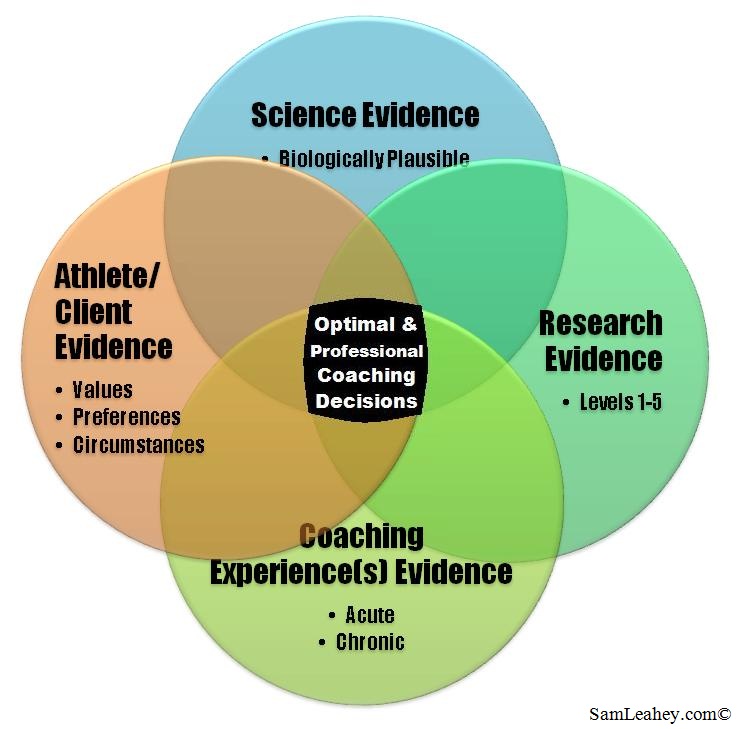
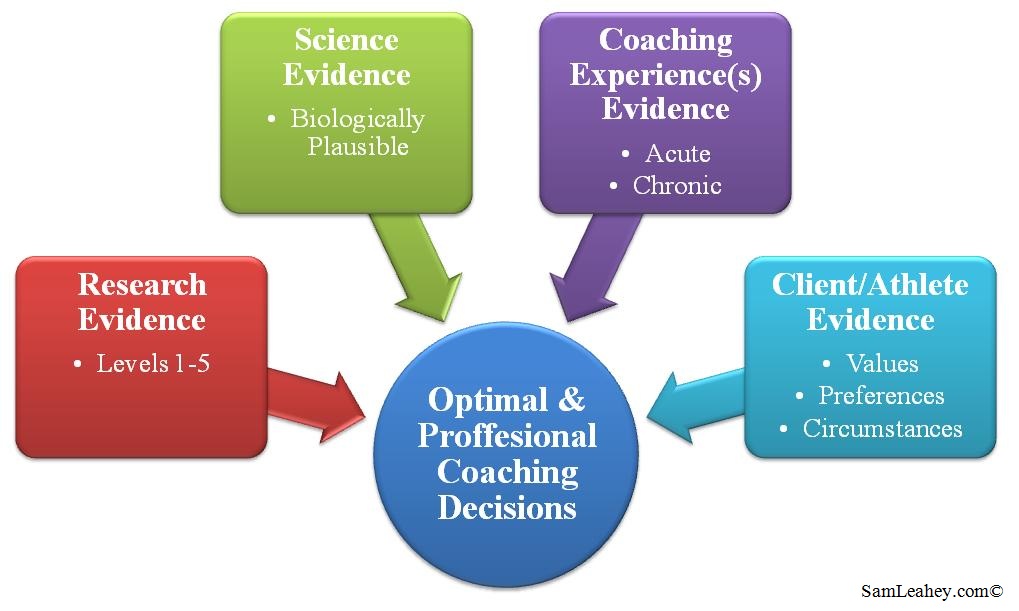
Common sense tells us that the best form of “evidence” is one that incorporates all types of evidence listed above. Yet how many coaches claim an “evidence-based” approach but do not consult all types of evidence? Conversely, how many coaches place greater stock in only one or two types of evidence while ignoring the rest by omission or ignorance? Lastly, you’ll have coaches who attempt to apply great concepts through the guides of evidence, but without a full command of the theory behind them and an understanding of how to integrate all types of evidence for optimal and professional coaching decisions.
Do you ever wonder why coaches engage in practices that are not supported by “evidence” yet do not implement practices that are very much substantiated by “evidence?” In fact, coaches often follow outdated policies and procedures without questioning their current relevance or accuracy, or the evidence for them. Either that or they’ve concluded that one type of evidence is superior to all the rest. This is a very unfortunate situation, especially for the athletes and clients being led by this particular coach. As coaches, our burden should be for serving others with excellence. This approach epitomizes Evidence-Based Coaching (EBC) while simultaneously cultivating more professional autonomy and career satisfaction. In any profession, evidence-based practice takes the willingness to challenge one’s assumptions and promotes less dependence on tradition through the integration of all types of evidence.
To put the graphics above in words, EBC is open, thoughtful, and professional coaching decision making about the handling of athletes/clients that integrates the best available science evidence, research evidence, coaching experience, and the athlete/client values, preferences, and circumstances while considering the larger social context and logistics in which coaching services are provided. All of which, optimizes outcomes.
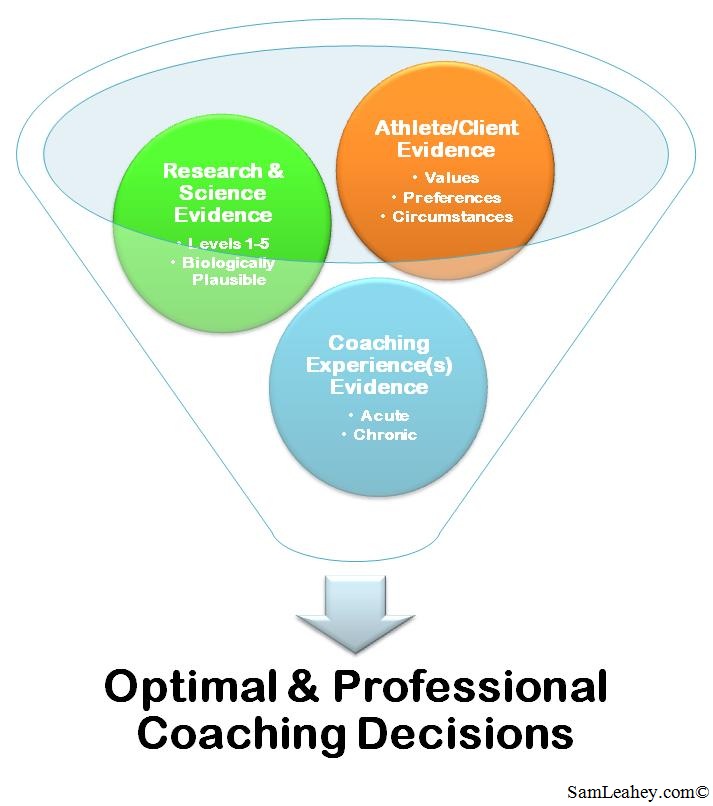
Each type of evidence could easily be discussed for days on end as there is so much rich depth to each. However, for the sake of brevity and clarity I’ll only briefly elucidate each type in the following sections.

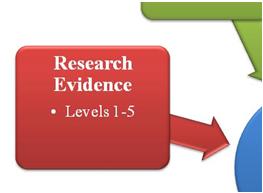
This is the type of evidence many people will think of first when the term “evidence” is used. As was explained above; however, it is only one part, not the whole. Peer-reviewed research evidence can be broken down into further sublevels of evidence in hierarchical fashion. Depending on the source and discipline, they might be broken down differently. Yet essentially they are more similar than different:
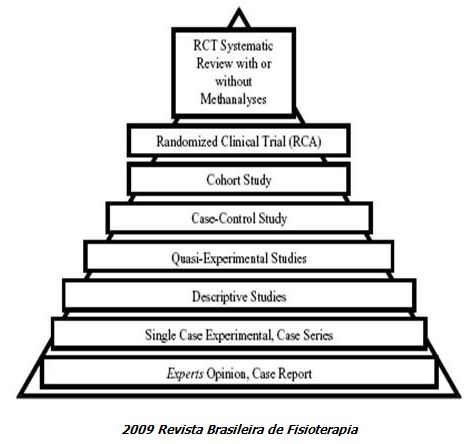
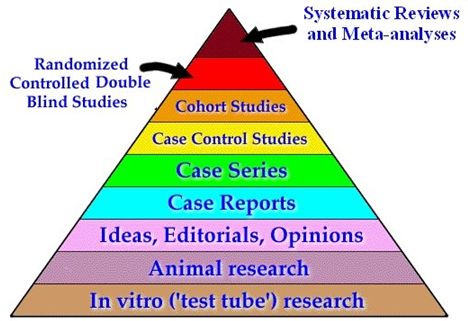
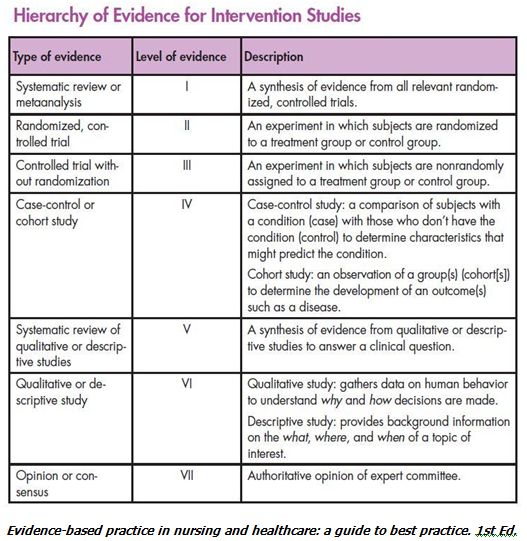
Another dichotomy of research could be seen in the difference between “quantitative/analytic” research and “qualitative/descriptive” research. The former is the hardest type of study to conduct but most convincing and the latter is the least convincing but easiest to conduct. Quantitative/analytic studies designs consist of case-control, experimental, and retrospective/prospective cohort studies. Examples of qualitative/descriptive study designs can be case-reports, case-series, and analysis of secular trends. We could also view the various study designs as options in timing – retrospective study, prospective study, or a cross-sectional study, as well as options in directionality – case-control study, cohort study, and experimental studies. Defining each study design is not necessary for this articles purpose. If you’re interested in a thorough elaboration and purpose of each study design I recommend the book The Research Methods Knowledge Base.
As coaches, we may adhere to a research evidenced based approach without even knowing it. Coaches of old have been utilizing certain procedures and protocols for years only to have research come out much later and explain why it worked. This is a very important point as many coaches will stop their thought process here and perceive research as nothing more than a validation tool for their programming. Either that or they’ll view research as a fun little way to read about the mechanisms of their success. This is very myopic and unfortunate. There’s much more to research than that! Coaches might have questions about optimal loading parameters, energy system development, rest periods between sets, differences between back squats and front squats, how agility is best developed and understood, periodization, mechanisms of elasticity and methods of enhancement , the transfer of training to competition, the role of hypertrophy in sports, athlete screenings/assessments, advanced loading strategies like complex or contrast training, how to best understand, define, and train the “core”, mobility progressions, and on and on and on. A coach may find a need for critically appraising modern training trends as well. Finding the answers to all these questions and so many more can certainly be aided (not completely solved) by looking into the current state of research to find what’s already been done on a topic of interest. Doing literature reviews is its own skill set. The answers may not be blatant and explicit (sometimes they are) but a coach should use the information to piece together a proper perspective on the situation and then integrate this type of evidence (research) with the other types originally mentioned. Even more noteworthy, what does a coach do when the research produces evidence multiple times again and again which suggests what you’re currently doing sucks and maybe even producing an undesired or negative training effect? Are we willing to change? Can we accept that we might have been “wrong?” Are we willing to lay down our own bias and question what we thought we knew? Think about it.
Knowledge deteriorates with time. Textbooks can be very much outdated even if only a few years old. Current research provides coaches with up to date information that is in many cases much more valid and reliable then mainstream sources and products. The addition of scientific expert synthesis (peer-reviewed research) and analysis gives coaches another tool to do their job better thus directly affecting the athletes/clients they coach.
Now, coaches need not be research experts or have the same level of working knowledge as a Ph.D. We simply need a level of understanding that allows us as practitioners to understand, critically appraise, apply, and disseminate the research to our colleagues. As consumers of the information each individual coach will have to determine what level of understanding he/she needs to better themselves. Without a doubt, it takes a bit of time to reap the full benefits of research evidence and a base level of statistical knowledge is necessary. You will also need access to field related databases and the ability to locate the research you’re looking for. Finding and reading research is its own skill set. A necessary one though if we are truly pursuing excellent coaching practices with a full perspective that consults all types of evidence when attempting to make professional and optimal coaching decisions. In this regard I fully recommend to any coach, or personal trainer for that matter, How To Read Fitness Research. Your knowledge and application of research will grow the more experience you allow yourself in understanding and integrating the information. Anything worth its while is time consuming and there is no excuse for not integrating research into your coaching practice.
All told however, not everything you want to know about can be found in the research world. For example you probably won’t find a long term study comparing variables of a High Intensity Training (HIT), block periodized program, Crossfit training programming, etc. all at once. Finding definitive and/or decisive research on certain topics that contain a lot of depth is tough sometimes. However you will find bits and pieces of information which you can combine to formulate an informed opinion. Ultimately, what and how much “high yield” information you discover is based on your searching skills in databases.

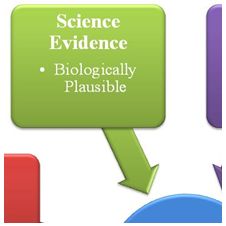
This type of evidence represents that which is not exactly peer reviewed research but information that is still rooted in science. Some will call this type of evidence “expert opinion”, which is the lowest level of evidence in the research hierarchies above. It can answer basic questions like “does it make common sense scientifically? Is it biologically possible?” In many cases the evidence you collect on a given topic does not have to come from research alone, but rather a scientific resource that has yet to be introduced to the research world. It can also, and often does, come from basic or applied science displines. Many modern day trends, procedures, tools, etc. at one point were “science-based” and not formally researched until years later. Does this mean the tool, procedure, etc. was “wrong” or invalid until it gained formal research credibility? Does it mean it wasn’t a reliable source or explanation when it was in its “science-based” stages? The answer is no. All it means is that it simply did not gain enough attention, interest, funding, etc. by research groups. Things like variable resistance (chains, bands, pneumatic) at one point were “science-based” tools. Yet coaches have been implementing them for decades. A coach today can now find tons of formal peer-reviewed research on the topic. The Functional Movement Screen is another tool that has finally hit the research setting and gained peer-reviewed credibility.
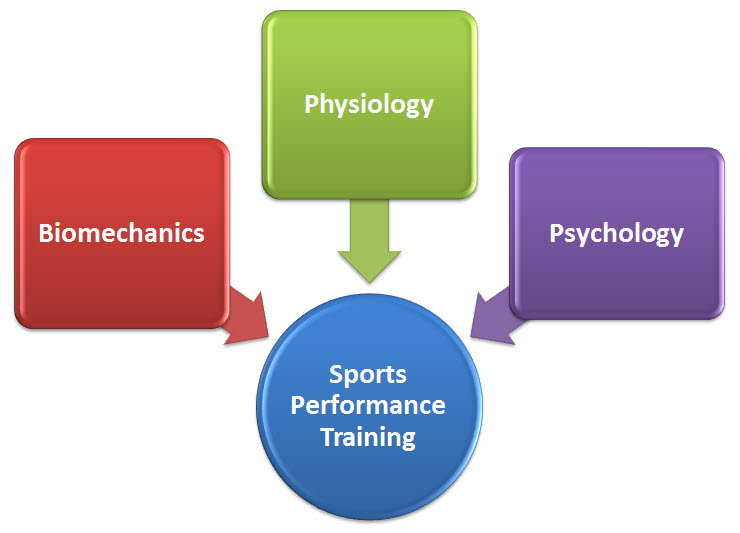
An Academic Discpline Perspective of What We Do.
Science evidence can be found in a number of places. This can include textbooks, some mainstream publications, mechanistic articles, internet resources, academic courses. Science evidence can also consist of principle arguments where a number of scientific principles are brought together to create a theory or construct. The major take home point regarding this type of evidence is that science-evidence is just as much “evidence” as research-evidence. Both are necessary and can aid a coach’s practice.

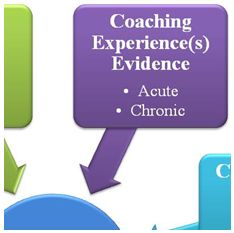
This type of evidence needs no long definition. It is simply the coaching experience you’ve amassed acutely and chronically. For many it represents the type of evidence you cannot do a research study on. It can serve as evidence of the intangibles as well. The acute aspect simply refers to the setting in which you currently work this exact moment in time. However when trying to understand the implications of one’s chronic coaching experience, a number of questions typically arise that need to be discussed.
When does one’s actual coaching “experience” begin? The reality is your chronic coaching experience began the moment you trained your first athlete/client. This is not mutually exclusive to fulltime employment status. Whether you were full-time, part-time, somewhere in the middle, or even paid at all, your coaching experience began exactly at that moment no matter how old or how young you were. Unfortunately, many coaches will discredit the experience of others under the accusations or allegations that “real coaching experience” only begins when you are “full time” in the “real world.” This is not only myopic, unfortunate, and unprofessional, but it opens the accuser up to criticism that he/she is insecure with their own coaching experience and/or intimated by the other individuals. The length of one’s coaching experience is irrespective of employment status, quality, and quantity. There is a differentiation between high quality and low quality experience(s) though, which begs the questions – how much difference does the quality of one’s coaching experience make in the grand scheme of things? Should quality overrule quantity? The answers are equivocal at this point but a number of implications warrant discussion here.
Consider the coach who works out of a commercial gym for decades yet fails to evolve with the science, does not provide his/her athletes with a rewarding experience, seeks out no mentorships, and pretty much fails to do much professional development all together. His/her results with their clientele is poor, client turnover is excessively high, but at the end of the day this coach doesn’t mind because he/she knows they’ll always replace lost clients by filling their time slots with other young impressionable athletes looking for the advertised “performance enhancement benefits.” Now consider a collegiate coach who worked his way up through the public sector ranks by getting a graduate assistantship positions out of college that includes him/her writing and implementing their own programs. This goes on for about two years of graduate school while he/she is getting mentored by an older coach at the institution. After which said coach takes an assistantship position at a division one college. Oddly, the conclusion of graduate school brings about a concurrent drop off in his/her active professional development and mentorship. Said coach is “in the real world now” and feels a sense of professional ease. Say 10 years pass and by now this coach is quite comfortable with their results given they’ve maintained a collegiate position for a decade, which is certainly an accomplishment. What would you think about this coach if you were to look deeper and discover much of their professional practice at the 10 year mark is pretty much the same thing as what they did the first year out of graduate school? What if their knowledge base hasn’t come far at all even with over a decade of coaching practice? Can we realistically expect an improved application without a concurrent rise in knowledge base? Most likely not. Granted there are other aspects of coaching that can certainly be improved without a rise in content knowledge, particularly in terms of social intelligence. But that is beyond the scope of this article.
Conversely, consider the coach who starts their career two decades after the previous coaches. From the start he/she actively pursues high quality mentors from the start and relentlessly attacks professional development and application. He/she continuously seeks to be the “dumbest” person in their circle of influence thus allowing for a constant sharpening of skills sets. Their results are accelerated through the wisdom of their mentors and their perspective elevated through deliberate practice. All the while said coach does not ignore the coach-athlete bond, constantly seeking to refine his/her social intelligence and coaching prowess to provide a rewarding training experience for everyone involved.
Lastly consider the coach who perhaps does not have a typical route of professional progression but merely bounces around from unique employment to unique employment. What if of those experiences each came with an opportunity to be mentored by top professionals? Along with each new position the coach gains a wealth of perspective but he/she does not stay at that one place for long enough to “settle down.” They enjoy moving around the country gaining high quality work experiences. In contrast to the first two coaching examples above, suppose this last individual’s time in the profession and overall work experience is only half as long. Could we say this coach has an advantage because instead of just having one single very long mediocre coaching experience as the first coaching examples, he/she has had a number of high quality experiences but in a shorter time period? Is it even more superior if this pattern of professional development continues for a decade or so before this coach “settles down” into one setting?
Examples like these are not as fictional as you think and can be seen across the world. Both the first two coaches have many years experience but the quality of that time is arguably low. This is not to say they are incompetent or even “bad” coaches, though some would argue it. It just means that the quality of their experience is lacking relative to others and they have not brought about their full coaching potential and therefore results. This can often stem from a lack of passion and/or insight. Compare and contrast the above four scenarios and its not farfetched to hear the former two coaches discrediting the latter two because they’ve “been doing this a long time”, especially if the younger coach’s methodologies stand in direct contradiction the older ones. In reality what should occur are all four professionals seeking to glean from each other and cultivate a respect for the other person’s experience, no matter how short or long, no matter the quality. True superiority attains both high quality and high quantity. If the younger coaches in the scenario were to cease their pursuit of professional excellence they are no better in the long run. In the end the elite coach will maintain professional vigor throughout their career.

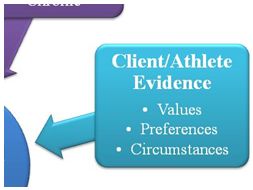
We are all guilty of forsaking this type of “evidence” at some point in our career. Many coaches can recall a time when they’ve made their coaching experiences about themselves instead of keeping the emphasis where it should be – the athlete/client. Essentially this act ignores the inherency of the coaching profession, which is serving others, and turns into a campaign for the coach. This is a mistake. Hopefully we have all learned from that point in time and have turned such a mistake into a strong ability for servant hood.
Suppose you’re a private sector coach and a new athlete signs up to train at your facility, he/she’s done nothing but a certain style of training for years and is looking for a novel approach to training but is too scared to undergo a completely new paradigm. Say he’s had great success with this other method of training and they’re convinced the reason behind their athletic accolades is this particular style of training. When you’re presented with this type of situation are you just going to rain on their parade and tell the bright eyed bushy tailed athlete that he/she doesn’t know what they’re talking about and their former modes of training suck? Are you going to poke fun at his previous programs and claim any “results” he/she previously earned was a fluke and not because of a good program? If you have the proclivity to do something like this and also can’t stand it when you encounter clients with “new” ideas and different ways of thinking than your own, then please do us all a favor and leave the coaching profession. It’s about winning people over to the truth and inspiring them. Not demeaning and degrading them so they’re shamelessly forced to see it your way. That would not be the definition of serving. In this scenario the client clearly had some strong preferences, values, and circumstance. A good coach will recognize this and wean them into the light instead of just bashing their darkness. Furthermore just because you’re the expert does not mean you are the only one carrying around expertise and “the light.” Said athlete may have a bit of knowledge you don’t have which was given to him by another expert in the field. All you have to do is simply listen and understand their perspective, you might even learn something yourself!
Another example of athlete/client evidence is when a particular team you’re coaching has a strong affinity for a certain activity you’ve done with them in the past or allowed them to have. This could be some kind of “finisher circuit”, a particular exercise say, or simply the genre of music you play in the weightroom while the team is lifting. Clearly the women’s cross country team is going to have a different musical taste then the men’s throwing team.
The major take home point here is that at the end of the day athlete/client evidence is real and demands attention. Some label this type of evidence as the “client experience/feedback.” A high quality coach will listen for and understand the wants and desires of the demographics he/she works with and in doing so will find a way to optimally blend the athlete/client evidence with the other types of evidence for optimal training outcomes and experience.



Now that we’ve discussed each type of evidence let us compare them for a proper perspective. An important point in this discussion is noting each of the components or types of evidence in the graphics above are the same size, indicating they each hold equal weight. No one type of evidence plays a bigger role or is more important than the others. Some will not want to accept this notion but it remains true. Many will try to pin one type of “evidence” up as the main source of credibility and “proof” but no matter the dogma attached with this approach it remains false.
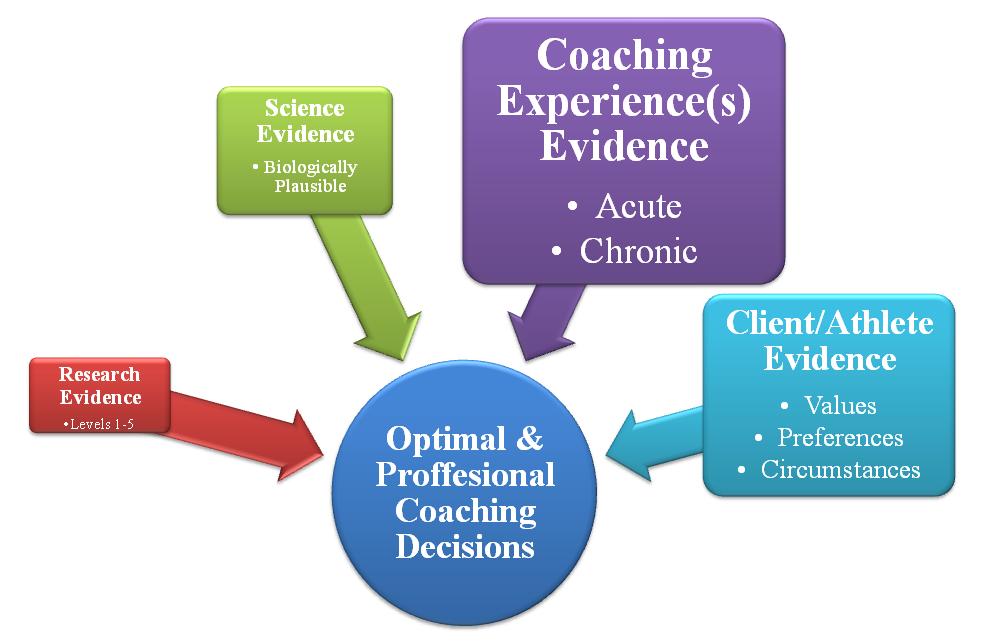
Unfortunately, this represents how some coaches think.
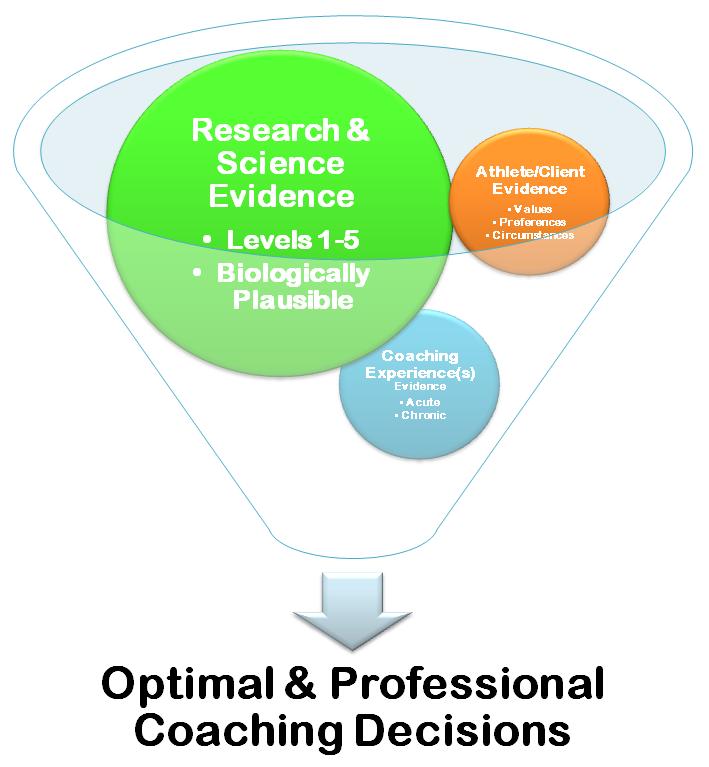
Unfortunately, this represents how some coaches think.
For the coach needing a long list of peer-reviewed research in order to take action, they should simply consult other forms of evidence and integrate them all in a coaching decision rather than waiting for research to get published. There may not be any formal research done on said topic but perhaps there’s plenty of basic science evidence to support their inclination. Compound that with the experience evidence of others and you should have plenty of information to work off of.
For the coach who proudly waves his/her coaching experience(s) evidence around and suggests “it’s all the evidence I need”, they miss the forest for the trees and severely miss out on untapped coaching potential which therefore affects their results in the long run.
For the coach who attempts to integrate all types of evidence yet somehow still concludes there is no good existing evidence they simply need to understand it’s less about finding the perfect type of evidence in all areas and more about integrating the best available evidence we have. That is still considered an “evidence-based approach” to coaching.
It makes perfect sense that in order to fully achieve and maximize potential we need to integrate all types of evidence in our coaching practice. In the context of serving others, which is at the heart of coaching and the essence of our profession, said integration is exactly how we accomplish this servant hood.

Philosophically, an evidence-based approach to coaching is sound, however, practically there are a few factors coming into play when one decides to implement evidence-based coaching. A major one is that of logistics. The business model and/or training model can certainly be a help or hindrance in your ability to implement evidence-based coaching. For example you may have located and read a number of research studies, particularly level one, that say a certain protocol is maximized under a particular set of conditions. If your settings logistics do not allow for you to facilitate those optimal conditions then you’re forced to make a compromise and simply integrate the evidence to the best of your abilities. Additionally, you may find yourself in a situation working with large groups of athletes that doesn’t allow for the same amount of relationship building with each athlete as the one-on-one setting does, thus making it harder for you to determine their individual values, preferences, and circumstances. Simply collect as much information as you can, build positive relationships, and consult this evidence to the best of your ability. Making an attempt at getting to know the values, preferences, and circumstances of your athletes is always better than not caring at all and not going out of your way do find it. Lastly, logistics can also hamper your attempts at integrating previous coaching experience evidence. You may have previously worked in a setting with a different set of logistics that primarily catered to certain populations of athletes. Now in your new setting, you might find your previous experiences don’t apply as much for the athletes you work with now. This does not mean you can’t draw from your previous experiences. It simply suggests that your previous experiences were different and best used in that particular setting. Now you may have to discover or develop a new skill set that better serves the demographics you currently work with.

All in all, there is no excuse to not implement evidence-based coaching. Truly being an “evidence-based coach” manifests in the active, purposeful, and continual enhancement and critique of one’s knowledge and application via the keyholes elucidated in this article. If you passively operate under evidence by luck, intuition, or simply imitating other coaches, you are not an evidence-based coach. Undoubtedly you will meet road bumps or challenges along the way to excellent servant hood but the outcome is far greater than any struggle. To produce professional and optimal coaching decisions and serve others best, we must integrate all types of evidence into our coaching practice.

Comments are closed.